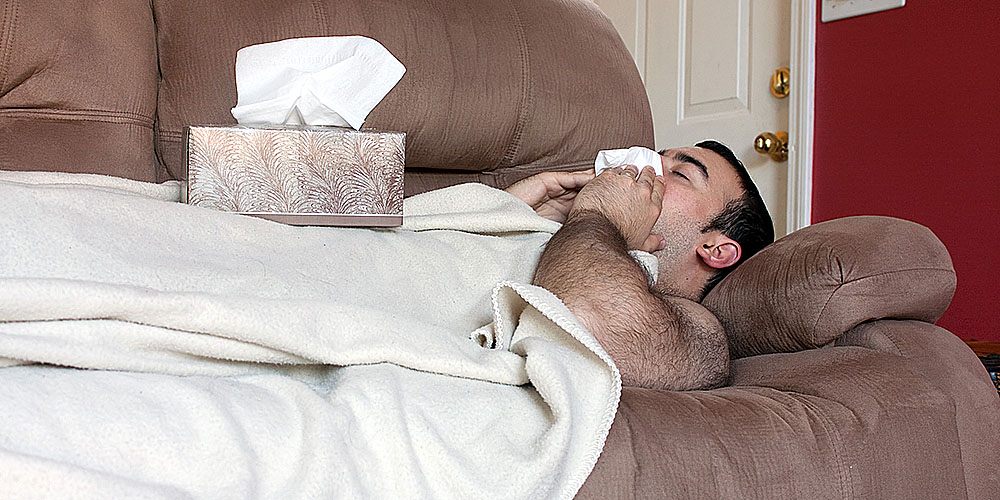A runny nose is irritating because you will need to keep tissues near you at times. To treat a runny nose, you can go to a general physician and if the cause is an allergy, they may refer you to an allergy doctor.
Therefore, it’s helpful to know the cause of the runny nose so you can try to treat it yourself if it’s something minor.
Runny Nose And Nasal Congestion
A runny nose can be caused with or without nasal congestion. Both are different. A runny nose is due to the excess production of nasal mucus. So, it drips from the nose and can sometimes drip down the throat as well.
On the other hand, nasal congestion is the swelling of the tissues of the noise. They are usually swollen due to inflammation. The airways become narrower due to this and it becomes difficult for you to breathe through the nose. Moreover, the mucus in the nose may feel stuck which is why it’s called a stuffy nose.
Common Causes Of A Runny Nose
Viral Infections
A viral infection is the most common cause of a runny nose. In this, a virus enters your body and makes you ill. Common cold, flu, and respiratory syncytial virus (RSV) cause a runny nose.
Cold Weather
A harmless reason for your runny nose can be the cold weather in your region. Your nose does multiple things before allowing it from the nostrils down to the lungs. It filters, humidifies, and warms the air.
In cold temperatures, the air is dryer than in warm temperatures. As the nose warms and humidifies air other than filtering, when the air it’s receiving is cold and dry, it works harder and releases more fluid. This can result in mucus dripping from your nose.
Allergies
Your runny nose can be due to an allergy. Allergic reactions in the nose are called allergic rhinitis or hay fever. A runny nose due to an allergy is caused by a trigger or allergen. Many people who have seasonable allergies are allergic to any type of tree or grass pollen.
However, pollen is not the only allergen that can cause allergic rhinitis. Indoor triggers like dust, mold, animal dander, and other household things can also cause hay fever.
If your runny nose is due to an allergy, you have yourself diagnosed so you learn the trigger(s) that are causing the allergy and runny nose. Not only can you treat the allergy quickly after knowing the allergens, but you change your routine to prevent exposure to those allergens.
Sinusitis
It’s also called a sinus infection. Sinusitis is the swelling of the nose tissues. These tissues are in the spaces in your forehead, cheeks, and nose. These spaces are usually filled with air. Due to an infection, they become filled with fluid. This causes the mucus to build up and the discharge is a thick, yellow or green mucus from the nose.
Moreover, you will feel pressure and pain in your face that is due to the irritation caused by the same spaces in your forehead, cheeks, and nose. Sometimes, you may also feel pain or pressure in your teeth.
Sinusitis is usually caused by common cold, but it can also happen due to viruses, bacteria, and allergies.
COVID-19
A runny nose can also be a symptom of a COVID-19 infection. Similar to other infections, your nose tries to stop any virus from entering the body causing a runny nose. If you have other symptoms of COVID-19 like dry cough or you suspect that you have the infection, get yourself tested. This even more important for people who have liver, kidney, or heart condition.
Overuse Of Nasal Sprays
A common treatment for a stuffy nose is a nasal spray decongestant. However, if you overuse these nasal sprays, they can stop proving to be helpful and might make your condition worse.
Cerebrospinal Fluid Leak
This is the rarest cause of a runny nose. Cerebrospinal fluid or CFS is a fluid that surrounds your brain providing a cushion for protection against injuries. Rarely, CFS can leak and cause a runny nose.
Conclusion
There are various causes of a runny nose. Visit a doctor to have yourself checked and learn the cause of the runny nose. If you have allergies or suspect that the runny nose is due to an allergy, then visit an allergy clinic Germantown.


